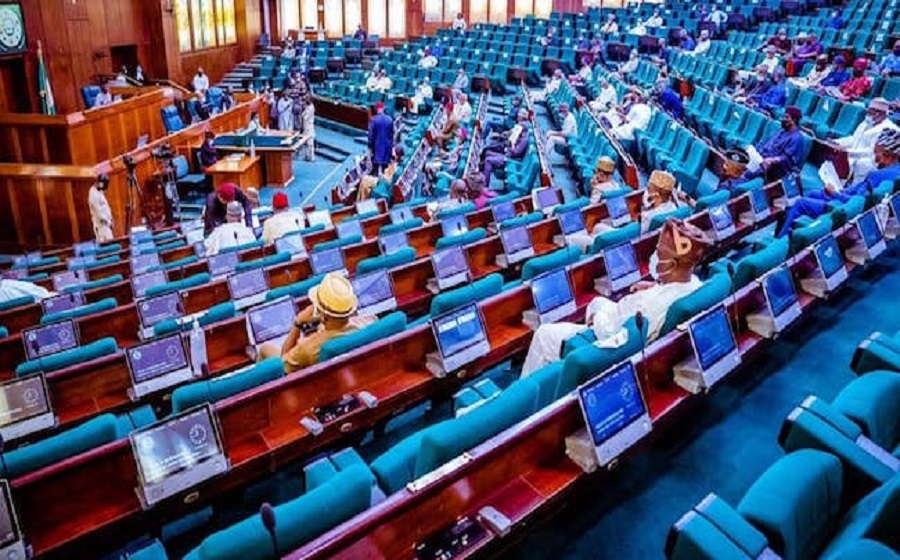The House of Representatives has cautioned the Nigerian Government against terminating the contract with Iris Smart Technologies Limited for the production of 10 million e-passport booklets.
The advice was given as the House considered and approved the report of the Ad-hoc Committee that Investigated the Proposed Domestication and Processing of the Nigerian International Passport laid by Ibrahim Hafiz during plenary.
The House posited that a unilateral termination of the contract which was entered into in 2015 would be detrimental.
It recommended the following; “That Iris Smart Technologies Limited (IST) Renewal Agreement with FMOI of April 2015, clearly stated in Article 4:0, that the duration of the contractor shall be for the delivery of an additional Ten (10) Million Passport Booklets;
“That time will be of the essence if the contract expressly states it or if there are clauses to show that parties intended time to be of the essence;
“It will be to the legal detriment of the Federal Government to unilaterally terminate this Agreement for any reason until it runs its course, which is the production of 10 Million e-Passports or the current remainder under the circumstances;
“The Nigerian Government can go into negotiations in line with paragraph 4 above with ISTL to explore suitable options of how the e-Passport infrastructure can be maintained until the contract is fully performed;
“That Central Bank of Nigeria (CBN) and the Nigeria Security Minting and Printing Company Limited (MINT) should be further advised to abide by this opinion in the overall best interest of the Federal Government in order not to incur unnecessary liability on our lean financial resources through avoidable litigation or other costlier dispute resolution mechanisms;
“That since the current domestication project was initiated by Nigeria Immigration Service (NIS) in conjunction with ICRC and based on the reports and presentations by all the relevant stakeholders, especially ICRC, the process was fair, equitable, transparent and followed all international standards. Therefore, the process should be allowed to be concluded;
“That the current management of NIS under the CG initiated the domestication process which requires 90 to 180 days to fully implement the process and other processes of the international passport which will solve the issues of scarcity;
“That the forex generated by Iris Technologies and NIS through the sales of international passports in foreign countries should be unlocked by CBN and allow NIS and Iris Technologies to have access to the revenue component generated to solve issues of scarcity of international passports before the domestication process.”
The Committee in its findings noted that the e-Passport project is technology based and not a security printing task.
It said that “the security printing aspect of an e-Passport constitutes only 13% of the various components of an e-Passport booklet.”
Other findings by the Committee are;
“That the domestication of the manufacturing of e-Passport booklets does not eliminate the need for Foreign Exchange and importation of components;
“That an e-Passport booklet is an active electronic device as against the old Machine-Readable Passport (MRP)which is a mere printed booklet;
“That the chip embedded in the e-Passport has a security access module that allows for a “handshake” with and amongst other devices and equipment within the ePassport network;
“That the system does not allow the “infiltration” or use of non-prequalified 3rd party devices or other booklets within the network;
“That MINT is not a technology company. MINT is a security printer and cannot be an e-Passport solution provider. Therefore, it requires a technology partner if it must go into the e-Passport project;
“That there are over N22 billion worth of systems and equipment both local and international in this secured e-Passport network. Therefore, if a new booklet solution provider is appointed, this technology infrastructure would have to be discarded. This investment would be lost, and a new network must be purchased and implemented at a greater cost to the Nigerian Government;
“That it is impossible to have 2 different e-Passport projects running concurrently in any country;
“That to establish a new e-Passport solution, it would require a duration of 36 to 48 months for the rollout of the new infrastructure with the attendant consequences that no e-Passport would be issued both locally and in foreign missions for that period;
“That as a result, there would be no passport issued and no revenue accruing from the project for the entire duration of the rollout of the new e-Passport solution.”



